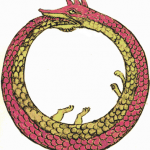 |
Christianity and Reincarnation |
The early Christian Gnostics used the symbol of Ouroboros a dragon swallowing its tail signifying the wheel of death and rebirth. The Gnostics aspired to become living Christs, beings that ultimately conquer spiritual ignorance. This transformation was to happen not after death but on earth within a physical body. Failure to achieve this goal meant being trapped in the death and rebirth cycle of Ouroboros. In the Gnostic “Secret book of John,” written before 185 A.D. Jesus explains to the apostle John that human souls are recycled by Jehovah, constantly thrown into forgetfulness and prisons, (prison here refers to the gnostic term for the physical body). John asks him how a soul can become liberated from the Ouroborous. Jesus answers saying ‘This soul needs to follow another soul in whom the Spirit of life dwells, because she is saved through the Spirit. Then she will never be thrust into flesh again.’ Thrust into flesh means reincarnation a term which has all but disappeared from the bible.
To understand why reincarnation was removed from the Christian teachings we need to consider the role of the roman emperor Justinian who in 545 A.D. was able to apply the full power of Rome and his authority to stop any teaching of reincarnation. He forced the ruling cardinals to draft a papal decree stating that anyone who believes that souls come from God and return to God will be punished by death.
Justinian was advised by his bishops that a belief in reincarnation meant that people would think themselves the equal of Jesus who of course also came from God into a physical body. This means the church would not have control over people if those people believed that like Jesus they originated from God.
So the decree turned this around by stating that God creates souls at the moment of conception and souls could only go to heaven if they followed the church’s teachings. This was a great way of keeping control over people because if they didn’t follows the church then damnation would be the result. So in one decree reincarnation was wiped from Christian teachings and has never been reinstated. Essentially it suited the church quite nicely to keep the people in ignorance believing the only way to salvation was by devotion to the church otherwise a life of eternal torment in hell would result after death.
The downside to this of course was that bad people might think well I’ve been bad so I’m doomed might as well carry on and be bad and reject the church. So the church introduced confessions which means people who had done ‘bad’ things could confess their sin and be given a mild punishment to absolve them from wrongdoing and get them back into the fold. The state known as purgatory was also conceived which meant if you were reasonably good but a bit sinful then a period in purgatory, (which is a place not as bad as Hell but still a bit rough), could absolve you from your sins and make you ready for heaven.
Later on the church realised there could be profit in extending this to the granting of indulgences which means those with money could buy their way out of sin and still get into heaven by purchasing some of these indulgences. A kind of ‘get out of jail free’ card which became very prevalent in medieval times.
Indulgences and purgatory eventually ran out of credibility and fashion. The modern view is that indulgences have been toned down and involve a fair bit of penance and not cash to gain your way to salvation. Similarly purgatory is still believed in in the Catholic Church but its role is played down and treated as a step on the way to heaven.
Reincarnation is certainly not part of the thinking of the Catholic and Anglican churches and probably never will be. Interestingly Dr Wambach was expecting some flak from the church over her research findings but to her surprise the church, especially some of the “born agains” regarded it as proof of an afterlife even if they didn’t all together agree with the mechanism of reincarnation.
David Pye, February 2016